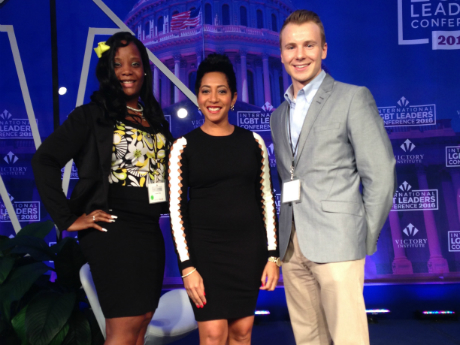With the support of the PAF Academic and Professional Development Fund, I attended Victory Institute’s International LGBT Leaders Conference in Washington, DC. In its 32nd year, the conference served as the first strategy and networking session for LGBT leaders following the November 2016 election.
The largest closed-door session of LGBT elected officials took place at the beginning of the conference as LGBT officials from across the nation strategized next steps to determine how to advocate for equality in the Trump administration. The following three days included plenary sessions, receptions, and breakouts to discuss subjects ranging from water quality and affordable healthcare to energy equality and the anti-immigration sentiment in America with policy and political experts.
Nine Members of the U.S. Congress – including Senator Tammy Baldwin of Wisconsin, Representative David Cicilline of Rhode Island, Representative Sean Maloney of New York, Representative Mark Pocan of Wisconsin, Representative Jared Polis of Colorado, Representative Krysten Sinema of Arizona, and Representative Mark Takano of California – led sessions and shared their perspectives on the fight for LGBT equality. Dozens of international LGBT elected leaders, including ten international legislators, and activists from 24 countries networked and shared best practices. And openly gay U.S. ambassadors to Denmark, Dominican Republic, Romania, and Vietnam encouraged leaders to stay vigilant in ensuring U.S. foreign policy remains inclusive of LGBT human rights.
During Secretary of the Army Eric Fanning’s briefing on the struggle for inclusion in the military, he said, “It’s important that our army look like our country.” Secretary Fanning’s statement underscored the resounding message of the conference that representation matters.
Whether for elected office, political appointee positions, government agency jobs, or the armed forces, the panelists and keynote speakers all spoke to the importance of all groups having a seat at the table. Being present and engaging in policy discussions humanizes the unknown of communities that some are unfamiliar with, while also presenting an opportunity to engage in dialogue and educate others about how policies impact different groups.
Secretary Fanning and other LGBT leaders drew attention to the still lacking diversity in positions of political and policy leadership. They suggested that decision making bodies should be representative of the demographics of the United States so that the diversity of perspectives across the country are present in policy discussions. And further, government agencies and armed forces should also “look like our country” in order to engage diverse perspectives in everyday decisions and everyday actions.
As a student of public administration, the discussions at the conference reinforced classroom discussions on the importance of considering equity when developing policy and considering potential impacts of a policy on different groups. And I want to thank the PAF alumni who give to the PAF Academic and Professional Development Fund for allowing me an incredible opportunity of networking, learning, and reflection.




